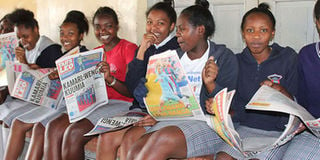To smash the stereotype, rewrite girls’ story

Maua Girls Secondary School, Meru County, students take part in the activation of Newspapers in Education project on October 8, 2019. PHOTO | FILE | NATION MEDIA GROUP
What you need to know:
- Consistently portraying women negatively on screen reinforces damaging stereotypes, limits their aspirations and affects how they view themselves.
- The girls’ narrative should be rewritten to encourage young women’s aspirations and ambitions instead of undermining them.
Jacinta, 19, knew exactly what she wanted to be the minute she could spell ‘career’.
She remembers standing in front of a mirror, when she was younger, and imagining herself in front of a camera, telling stories to the world.
She would watch the female anchors read the news and immediately retreat to put it all in practice — the poise, the diction. She was ready — until the day her big sister told her she didn’t ‘fit the bill’.
She remembers the day. She had just received news that she had performed well in her high school exams and was excitedly looking through courses that would take her into journalism.
“Journalists don’t look like you!” her elder sister had told her. “You are not pretty enough; they will not take you in.”
Sometimes, Jacinta admits, she would look in the mirror and wonder if she was pretty enough. Most days, though, that thought would be drowned by the excitement that was her childhood dream.
WORLD VIEW
But when her sister said it, it was loud. Final. It was a stereotype that quickly shredded her ambitions. One that has walked through generations, propagated by societal practices and amplified by the media. (Or is it the other way around?)
How girls and young women are portrayed through the media, in textbooks, in advertising, on screen, in video games and in other forms of communication significantly influences how the world views them and how they view themselves.
A recent Plan International report speaks to how the stereotypes are reinforced by media and entertainment, limiting girls’ ambitions and undermining their power to lead change.
Girls and young women have told us clearly that they are influenced by what they see on screen, and the underlying messages of the films analysed have changed little for decades: male characters dominate the storylines; women leaders may be portrayed as intelligent, likeable and effective but are also sexualised and objectified; female leadership is rare and national level women leaders are not up to the job.
CAREER
This reinforces existing stereotypes and sends a signal to girls and boys about what they can expect and what is expected from them.
Jacinta, for instance, is now a first-year economics student at one of the city institutions. Due to the stereotype, she chose the ‘safer’ route, proving that consistently portraying women negatively on screen reinforces damaging stereotypes, limits their aspirations and affects how they view themselves.
Storytelling could be one of the most powerful tools to unlock the potential and leadership of girls, yet the stories of their power, diversity and agency are rarely shared.
We need to provide a balanced picture of women’s diverse lives and contributions to society in a changing world. Girls want the world’s storytellers to stop promoting harmful stereotypes and start telling their stories with truth and respect.
Jacinta says she wants to be recognised because of her brains and not her beauty but, to be it, she must see it. The girls’ narrative should be rewritten to encourage young women’s aspirations and ambitions instead of undermining them.
The media has the ability to deliver dreams to girls and boys about what they can be and what this world can be like. That is the power of story. Can we help the girl/young woman #Rewriteherstory?
Mr Yates is regional director, Plan International — East and Southern Africa and the Middle East. [email protected]




